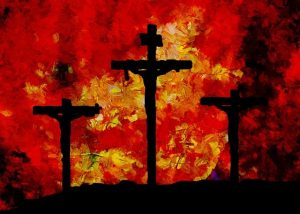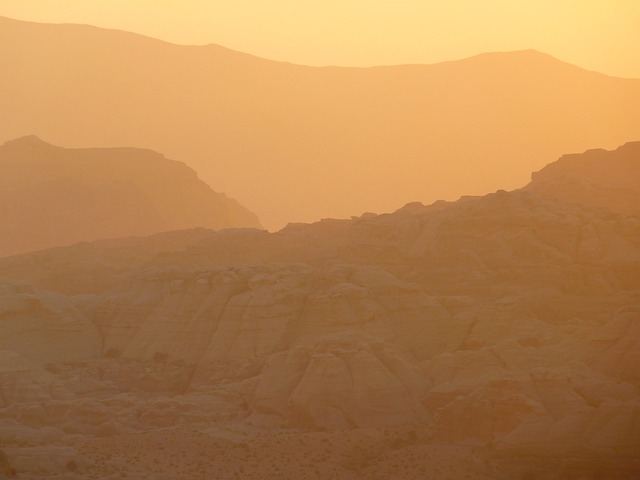5. Last Hour on the Cross
187:5.1
Although it was early in the season for such a phenomenon, shortly after twelve o’clock the sky darkened by reason of the fine sand in the air. The people of Jerusalem knew that this meant the coming of one of those hot-wind sandstorms from the Arabian desert. Before one o’clock the sky was so dark the sun was hid, and the remainder of the crowd hastened back to the city. When the Master gave up his life shortly after this hour, less than thirty people were present, only the thirteen Roman soldiers and a group of about fifteen believers. These believers were all women except two, Jude, Jesus’ brother, and John Zebedee, who returned to the scene just before the Master expired.187:5.2
Shortly after one o’clock, amidst the increasing darkness of the fierce sandstorm, Jesus began to fail in human consciousness. His last words of mercy, forgiveness, and admonition had been spoken. His last wish—concerning the care of his mother—had been expressed. During this hour of approaching death the human mind of Jesus resorted to the repetition of many passages in the Hebrew scriptures, particularly the Psalms. The last conscious thought of the human Jesus was concerned with the repetition in his mind of a portion of the Book of Psalms now known as the twentieth, twenty-first, and twenty-second Psalms. While his lips would often move, he was too weak to utter the words as these passages, which he so well knew by heart, would pass through his mind. Only a few times did those standing by catch some utterance, such as, “I know the Lord will save his anointed,” “Your hand shall find out all my enemies,” and “My God, my God, why have you forsaken me?” Jesus did not for one moment entertain the slightest doubt that he had lived in accordance with the Father’s will; and he never doubted that he was now laying down his life in the flesh in accordance with his Father’s will. He did not feel that the Father had forsaken him; he was merely reciting in his vanishing consciousness many Scriptures, among them this twenty-second Psalm, which begins with “My God, my God, why have you forsaken me?” And this happened to be one of the three passages which were spoken with sufficient clearness to be heard by those standing by.187:5.3
The last request which the mortal Jesus made of his fellows was about half past one o’clock when, a second time, he said, “I thirst,” and the same captain of the guard again moistened his lips with the same sponge wet in the sour wine, in those days commonly called vinegar.187:5.4
The sandstorm grew in intensity and the heavens increasingly darkened. Still the soldiers and the small group of believers stood by. The soldiers crouched near the cross, huddled together to protect themselves from the cutting sand. The mother of John and others watched from a distance where they were somewhat sheltered by an overhanging rock. When the Master finally breathed his last, there were present at the foot of his cross John Zebedee, his brother Jude, his sister Ruth, Mary Magdalene, and Rebecca, onetime of Sepphoris.187:5.5
It was just before three o’clock when Jesus, with a loud voice, cried out, “It is finished! Father, into your hands I commend my spirit.” And when he had thus spoken, he bowed his head and gave up the life struggle. When the Roman centurion saw how Jesus died, he smote his breast and said: “This was indeed a righteous man; truly he must have been a Son of God.” And from that hour he began to believe in Jesus.187:5.6
Jesus died royally—as he had lived. He freely admitted his kingship and remained master of the situation throughout the tragic day. He went willingly to his ignominious death, after he had provided for the safety of his chosen apostles. He wisely restrained Peter’s trouble-making violence and provided that John might be near him right up to the end of his mortal existence. He revealed his true nature to the murderous Sanhedrin and reminded Pilate of the source of his sovereign authority as a Son of God. He started out to Golgotha bearing his own crossbeam and finished up his loving bestowal by handing over his spirit of mortal acquirement to the Paradise Father. After such a life—and at such a death—the Master could truly say, “It is finished.”187:5.7
Because this was the preparation day for both the Passover and the Sabbath, the Jews did not want these bodies to be exposed on Golgotha. Therefore they went before Pilate asking that the legs of these three men be broken, that they be dispatched, so that they could be taken down from their crosses and cast into the criminal burial pits before sundown. When Pilate heard this request, he forthwith sent three soldiers to break the legs and dispatch Jesus and the two brigands.187:5.8
When these soldiers arrived at Golgotha, they did accordingly to the two thieves, but they found Jesus already dead, much to their surprise. However, in order to make sure of his death, one of the soldiers pierced his left side with his spear. Though it was common for the victims of crucifixion to linger alive upon the cross for even two or three days, the overwhelming emotional agony and the acute spiritual anguish of Jesus brought an end to his mortal life in the flesh in a little less than five and one-half hours.6. After the Crucifixion
187:6.1
In the midst of the darkness of the sandstorm, about half past three o’clock, David Zebedee sent out the last of the messengers carrying the news of the Master’s death. The last of his runners he dispatched to the home of Martha and Mary in Bethany, where he supposed the mother of Jesus stopped with the rest of her family.187:6.2
After the death of the Master, John sent the women, in charge of Jude, to the home of Elijah Mark, where they tarried over the Sabbath day. John himself, being well known by this time to the Roman centurion, remained at Golgotha until Joseph and Nicodemus arrived on the scene with an order from Pilate authorizing them to take possession of the body of Jesus.187:6.3
Thus ended a day of tragedy and sorrow for a vast universe whose myriads of intelligences had shuddered at the shocking spectacle of the crucifixion of the human incarnation of their beloved Sovereign; they were stunned by this exhibition of mortal callousness and human perversity.
Brief Commentary
Sections 5 through 6 provide detailed content of the final moments of Jesus’ mortal life. The page’s description, “Last Hour on the Cross”, captures the dramatic events that unfolded, both in the natural elements and the human reactions surrounding this moment in religious history. The passage describes the atmospheric changes, with the sky darkening due to a sandstorm from the Arabian desert. This environmental phenomenon serves as a backdrop to the unfolding drama, emphasizing the gravity and solemnity of the occasion. The dwindling crowd, driven back to the city by the intensifying storm, leaves only a small group of individuals present, including Roman soldiers and a handful of devoted disciples.
As Jesus approaches the culmination of his mortal journey, the text provides insight into his state of mind and physical condition. The portrayal of his failing human consciousness, coupled with his last words of mercy, forgiveness, and concern for his mother, conveys the depth of his compassion and commitment to fulfilling the Father’s will. The recitation of passages from the Hebrew Scriptures, particularly the Psalms, shows us Jesus’ strong connection to the Jewish traditions of his time.
As we continue the gradual progression of events, such as Jesus’ repeated expression of thirst and the soldiers’ response, the sandstorm intensifies, symbolically mirroring the spiritual tempest surrounding the crucifixion. The account then reaches a high with Jesus’ final words, “It is finished! Father, into your hands I commend my spirit.” These words certainly capture the triumphant conclusion of our Master’s initial earthly mission. The reaction of the Roman centurion, acknowledging Jesus as a righteous man and possibly a Son of God, underscores the deep impact of Jesus’ extraordinary life and death.
The subsequent scenes, including the soldiers confirming Jesus’ death and the dispatching of messengers to spread the news, add more details for us. The passage concludes by showing the universal significance of the day, depicting it as a moment of deep sorrow and tragedy for the multitude of intelligences across the vast universe. What we have in this section of our reading is a comprehensive and emotional portrayal of the events surrounding Jesus’ crucifixion, combined with elements of nature, human emotion, and divine purpose in a life of spirituality and sacrifice.
Life Lessons
 This section of today’s reading imparts lessons about faith, compassion, endurance, sacrifice, and the pursuit of spiritual values in the face of very difficult challenges.
This section of today’s reading imparts lessons about faith, compassion, endurance, sacrifice, and the pursuit of spiritual values in the face of very difficult challenges.
Jesus’ unwavering commitment to the Father’s will is a central theme in this account. Despite the immense suffering and pain, Jesus maintains a deep trust in the Father’s divine plan. This shows the importance of making sure our life is in line with our heavenly Father’s purpose and having faith in the greater cosmic order, even when we are facing adversity.
Jesus’ last words include expressions of mercy, forgiveness, and concern for the well-being of others, notably his mother Mary. Even in the midst of his own suffering, he exemplifies compassion and forgiveness, placing emphasis on the importance of extending grace to others, especially in challenging circumstances.
Today’s reading portrays Jesus enduring physical and emotional agony during the crucifixion. His ability to endure the pain and maintain composure demonstrates the power of inner strength and the ability to withstand forces beyond our control. This serves as a lesson for us when facing our own trials, encouraging us to persevere with dignity and purpose.
Jesus willingly accepts his fate and submits to the crucifixion for the greater good of humanity. This act of self-sacrifice teaches the value of humility, selflessness, and a willingness to put the needs of others above personal comfort. It invites reflection on the need for service and sacrifice for the betterment of others.
Jesus, even in his dying moments, affirms his spiritual authority and kingship. This acknowledgment of divine sovereignty shows the importance of recognizing and submitting to higher spiritual principles in our life. His example should encourage us to seek spiritual guidance and live in harmony with our Father’s purposes and values.
The reaction of the Roman centurion, acknowledging Jesus as a righteous man, reinforces the fact that righteous living leaves a lasting impact on others. Striving for righteousness and moral integrity can inspire respect and recognition, even in the worst of circumstances.
Jesus’ regal demeanour and composed acceptance of his impending death demonstrate a deep sense of dignity and grace. For us, this can serve as a lesson on facing mortality with acceptance, embracing the inevitable with a sense of spiritual readiness and peace.
Prayer
 Divine and Eternal Father, source of all mercy and love, in humble reverence, we come before You, acknowledging the sacrifice and selfless devotion of Your Son, Jesus, during the last hour on the cross. As we reflect upon the events that unfolded in that moment in history, we are full of awe and gratitude for the boundless love manifested through his life and death.
Divine and Eternal Father, source of all mercy and love, in humble reverence, we come before You, acknowledging the sacrifice and selfless devotion of Your Son, Jesus, during the last hour on the cross. As we reflect upon the events that unfolded in that moment in history, we are full of awe and gratitude for the boundless love manifested through his life and death.
Father, grant us the strength to our lives in line with Your will, just as Jesus did, even during such a horrible situation. May we find inspiration in his unwavering commitment to Your divine plan, knowing that, through our own trials, we are drawn closer to Your purpose for our lives.
In moments of suffering and despair, instil within us the spirit of compassion and forgiveness that Jesus so beautifully exemplified. May we, like him, extend mercy to those who transgress against us and uphold the value of love even during times of adversity.
As we cope with life’s trials, grant us the strength to endure with grace, remembering that true strength lies in our ability to persevere with dignity and purpose. Father, teach us the humility to submit to Your higher calling, embracing a life of service and self-sacrifice for the good of others.
In our pursuit of righteousness, guide us to live in accordance with Your divine principles, that our actions may inspire respect and recognition from those around us. Help us recognize and submit to the spiritual authority that governs our existence, and may our lives be a testament to the power of faith.
Father, grant us the serenity to face our own mortality with the same regal demeanour and composed acceptance that Jesus demonstrated on the cross. May we find solace in the knowledge that, through Your eternal grace, we shall transcend the limitations of our mortal existence and commune with You in everlasting peace. Amen.
Questions
What unusual natural phenomenon occurred during the last hour on the cross, and how did it impact the surroundings?
Who were the individuals present at the crucifixion when Jesus gave up his life, and what significance did their presence hold in the narrative?
Describe the emotional and physical state of Jesus during the final moments of his mortal life.
What was the significance of Jesus’ last words, especially his proclamation, “It is finished! Father, into your hands I commend my spirit”? How did this statement reflect his attitude toward his earthly mission?
How did the soldiers and the small group of disciples react to the intensifying sandstorm and the darkening of the heavens during the crucifixion?
What role did John Zebedee, Jesus’ brother Jude, and the other individuals present play in the events following Jesus’ death, particularly in relation to his body and the message of his passing?
How did the Roman centurion respond to Jesus’ death, and what transformation did he undergo in his belief?
In what ways did Jesus demonstrate his kingly and regal nature, both in life and in the manner of his death?
Photos courtesy Pixabay
